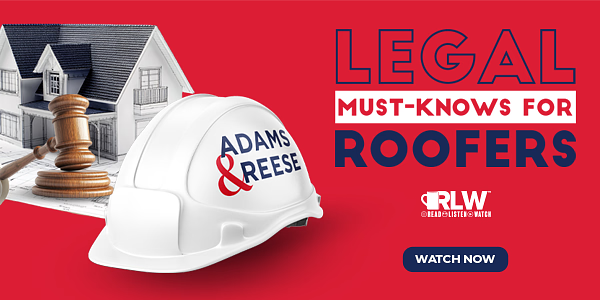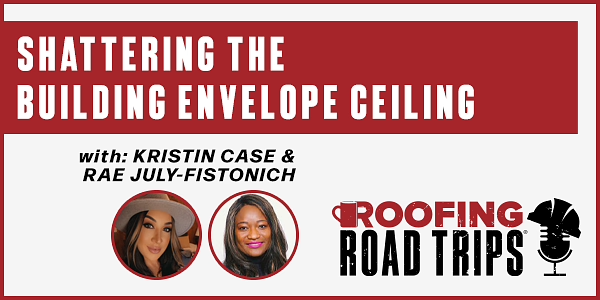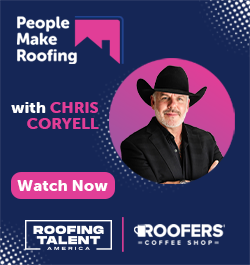Legal Must-knows for Roofers - PODCAST TRANSCRIPT
April 24, 2025 at 12:00 p.m.Editor's note: The following is the transcript of a live interview with Ashlee B. Poplin, partner at Adams & Reese. You can read the interview below, listen to the podcast or watch the recording.
Karen Edwards: Hello everybody. Welcome to this read, listen, watch from Roofers Coffee Shop. My name is Karen Edwards and I'm going to be your moderator today and I am thrilled for this topic today. It's just going to be amazing. Thank you to Adams & Reese for sponsoring this and its Legal Must-knows for Roofers. Before we get into introductions though, I do just want to have a little bit of housekeeping.
This is being recorded. It will be available online typically within 24 to 48 hours. So you can share it and if you want to refer back to it, don't feel like you have to take frantic notes because this will be online, you can watch it at your leisure. So let's start by welcoming Ashlee Poplin from Adams & Reese. Ashlee, can you please introduce yourself. Tell us a little bit about your background.
Ashlee B. Poplin: Yes, thank you so much for having me. I am an attorney with Adams & Reese. I practice out of the Charlotte, North Carolina office and I specialize in construction law. So I'm on the construction team that we represent contractors, subcontractors, trades and can help you with anything from preparing your contracts and on the front end to helping you with litigation or arbitration if that becomes a need.
Karen Edwards: Welcome, Ashlee. And if you didn't see that middle paragraph, she's been recognized lots of times by her colleagues, peers, best lawyers. So congrats, Ashlee. We are doing something a little bit different with this RLW today. The chat is wide open and we're going to be taking your questions throughout because we're going to be talking about a lot of different topics. If you want to start by dropping a chat in there, let us know who you are, where you're Zooming in from today, that would be awesome.
And if you do have questions, like I said, drop them in there during the conversation and I'll be keeping an eye on the chat and we'll answer your questions in real time. We also will have a little bit of time at the end where we can take additional questions. So let's dive right in. And the first thing we want to talk about is the legal structure of businesses. Ashlee, can you give us some insight into the different types out there and why it matters?
Ashlee B. Poplin: Yes, so this is when you're thinking about starting a roofing company. So if you're looking at, "What kind of entity do I need to set up, what does that mean for me?" There are several different types of entities. You can have an LLC, which is a limited liability company. You can have a sole proprietorship, a partnership. There are several different forms of these and I would encourage you to talk with your legal professional and also your CPA when you're setting this up to see what the best structure is for you. Most likely if you're a smaller sized roofing company, an LLC is probably going to be the way to go.
What that is, a limited liability company means it protects you from having your personal assets exposed in the event of any sort of litigation or liability. In order to be protected under an LLC, there are certain things that you're going to have to do. You need to have an operating agreement that specifies how you're going to function, who your members are. And then you're also going to want to have meeting minutes, even if it's just you as a sole member managed LLC, you still need to have meeting minutes documenting and noting just some basic business formalities, what type of profits you're having, losses you're experiencing, any sorts of ideas that you may have coming up on your business plan.
And it seems silly when you're thinking, "Why do I need to have meeting minutes with myself?" And the purpose of that is because you have to do something called keeping up with corporate formalities and that is a formality is having these meeting minutes. Also, some other things, making sure you have a separate bank account for your business, making sure you're not mingling personal assets with business assets and you're keeping those separate. And the reason that's important is because if anything were to go wrong and someone tries to file a lawsuit against your business, if you have not kept your business separate from your personal, then there's another legal term called piercing the corporate veil.
And it's a fancy term that essentially means you've got this veil of the LLC that is protecting you personally from liability. But if you are not following the corporate formalities and you're flipping that veil up and coming out from under it and it's actually just you and you're only using the LLC to shield yourself, then that veil can be pierced in there. You can be exposed personally to liability. So you want to make sure you keep up those formalities.
Karen Edwards: Wow, I just learned something because I do have an LLC and I do have a separate checking account, so that's good. But I'm not taking meeting minutes, so I guess I need to start, huh?
Ashlee B. Poplin: It's just the more you can document to show that these are separate entities, the better off you will be in the event something were to happen. Also, we've got here S-corp or C-corp. So an S-corp and a C-corp, these are tax designations from the different sections of the tax code. This is something you're going to want to discuss with your CPA about how you handle these S-corp. The taxation flows through and is reported on your individual taxes.
A C-corp you would be taxed twice and so that would be... Usually an S-corp is better for a smaller company and a C-corp is better if you're a larger roofing company looking to eventually go public or something like that. And you can of course discuss the tax benefits, pros, cons, how to set it up, how to proceed with your CPA and your attorney, but that's generally how those work. And you can have an LLC, which is either designated as an S-corp or a C-corp.
So those are not in and of themselves separate entities like an LLC or a partnership or something like that. They're the type of taxation that you will experience because you have to pay business taxes and it's just how are those business taxes going to be reported? And that's what that's about.
Karen Edwards: So we just had a question about... Maybe we can summarize that because I know Zoom makes you download the app sometimes or forces an update and they miss the first part. But what we were saying about the LLC was even if it's just you, that the LLC provides a kind of veil and protects your personal property and money and that's important to have a separate business account, bank account for your LLC, but that you still need to be, what did you call it? Following the corporate-
Ashlee B. Poplin: Corporate formalities.
Karen Edwards: Corporate formalities and having an annual meeting and taking minutes and making notes about your business and your business plan. Did I do a good job summarizing that?
Ashlee B. Poplin: You did. You did perfect.
Karen Edwards: Okay. Okay. And so if you have any specific questions in that area, go ahead and chat it to us and we can answer that. So as you mentioned, taxes differentiates between taxes liability and talk to your legal and accounting professionals to decide what's right for you. And it is possible to change, right? If you've set up one way and you're like, "Oh no, I think this would be better for me." How does that work?
Ashlee B. Poplin: Yes, you can change it. There are different designations and tax forms that you'll have to file to do that. So that's definitely something you want to do in tandem with your CPA to make sure that you don't end up having a large tax bill that you're facing in the future because you didn't understand what you were getting yourself into or how to properly change that over. But yes, you can always do that. With your LLC, say if you were doing an LLC S-corp, that's usually the standard sort of type of way that you would set up a small roofing company that's going to help you avoid the double taxation, your profits will pass through onto your personal tax returns.
And then your C-corp, you'd have a corporate tax plus personal tax dividends. But that would be the stronger way to go if you're setting yourself up for a large scale operation, if you plan to scale high. And so that makes sense, Karen, to your point that if you're starting out smaller an LLC S-corp makes sense, but if you see that you're tending to scale and grow, then maybe it comes necessary later to change that tax designation to a C-corp.
Karen Edwards: Excellent. Thank you. You're making it so easy to understand and I always struggle to wrap my head around a lot of the legal stuff. So my next slide, there we go. Let's talk about starting a business. So LLC S-corp is one of the most common ways you mentioned. Can you talk a little bit about the additional things that you need to consider when you are getting started?
Ashlee B. Poplin: Yes. So this slide is very important. You need to have the required license, permits and meet the requirements of your state. And then we'll talk a little bit more about the bonding and insurance, but particularly you need to know what is required in your state. Some states require you to have a general contractor's license in order to do briefing. And so you need to make sure that if you are in one of those states, you have properly studied for, passed the exam, gotten your general contractor's license. And there are several different requirements per state that you have to meet to be able to get that license.
So for example, in North Carolina, where I am at, you have to have a general contractor's license to perform roofing on anything that's over $40,000. In Florida, Texas, California, some of those states you have to have special roofing specialty license to do the work that you're doing. And then in some states you don't have to have a license at all and you can proceed without that. And so it's important to know one, what state you're in to find out your licensing because it may a roofing classification license that you can have or it may be you need a general contractor's license.
For example, South Carolina, anything over $5,000 requires a general contractor's license. So you don't need to be doing roofing in South Carolina unless you have the proper license. Permits, of course, if you don't have the proper license, you can't pull the proper permit. So that's another thing that you need to make sure that you're following. And then sometimes certain states within the municipality within those states, meaning the city within those states, sometimes they require special license as well. And so you need to make sure that you're just looking into, "What states am I going to practice in? And what counties or municipalities may have specific provisions."
So for example, if I know that I want to open a roofing business in Charlotte, North Carolina, that's where I'm going to look. "What does North Carolina require? Does Charlotte have any specific subcategories that they require?" If I'm going to branch outside of Charlotte to five cities or counties surrounding it, then I'm going to look at those five cities or counties surrounding me and make sure that there's nothing special that I need to know about for those counties as well. So that's how you're going to look at it when you're starting. Start by getting a map saying, "These are the states I'm going to practice in, what license do I need?" And then narrow it down to the counties to see if there's any specific permits or licensing that you need with that city or county.
Karen Edwards: What kind of department... I would go to my state's website probably is where I would start. What am I looking for? Is there a department of licensing? Who oversees that and is it typically named the same thing in each state?
Ashlee B. Poplin: Unfortunately it's not named the same in each state and in each state it's actually different. So North Carolina is the North Carolina Licensing Board for General Contractors and it's got the acronym for the first letter of each of those. South Carolina is a South Carolina licensing department, but you can usually find that with a simple Google search of, what is a roofing contractor required to have as far as a license in your state?
And it will likely within the first few hits give you the page that is appropriate. Or of course you can call somebody that works in that area and say, "Hey, what's the licensing department for Florida?" Or, "What's the licensing department for North Carolina or South Carolina?" And somebody can direct you there, but unfortunately it's not one website that you can go to and get to all of them. And they're not all named the same thing. It varies.
Karen Edwards: Wow. Okay. And in most cases, I know Florida in particular requires credits like that the contractors take classes and submit credits. It probably varies by state, I guess.
Ashlee B. Poplin: It does.
Karen Edwards: How long that license is good for and if you have to re-up or renew.
Ashlee B. Poplin: That's right. It does vary by state and also it varies how often you have to get those continuing education credits that you're talking about, how many you have to have varies by state and it also varies by license. So some states have a tiered system in their licensing and depending on what tier you're in, depends on whether you have to participate in the continuing education. Some states have done away with the continuing education altogether, so that will vary.
But each state has a specific set of requirements. A lot of them depend on your background and expertise, like how long have you been in the industry? You have to get some character letters saying that you're able to do what you're wanting to do. There's usually a financial component to it as well showing that you have the financial ability to operate as a contractor. And then there's an exam, usually an exam that you have to take. And some states have reciprocity between the states, so if you have taken the exam in one state, you can look to see if that state has reciprocity with a different state so you don't have to take it twice.
There's also different exams for different states. So even though North and South Carolina border each other, South Carolina also requires a law section to their contractors exam. And so they have two exams that you have to take for your South Carolina license where North Carolina only requires the general contractors licensing test. So it definitely varies. Definitely look at what your state requires and make sure you follow those rules. They're laid out pretty specific, so you know what's required if you going into it. And there is a detailed application process and that is always submitted to whatever board is in charge of the licensing and then they get to go through and approve it.
That board, they are also the ones who can hand down certain penalties or revoke your license if you're doing something you're not supposed to. So that's why you have to be registered and on file with these licensing agencies.
Karen Edwards: And what kind of fees are associated with these licenses? I'm sure that that varies by state too.
Ashlee B. Poplin: It does. It does. It's usually, I think for North Carolina it might be 300 for the exam to sit, but that will vary depending on what state you're in and what you're getting. And you can also have a qualifier. It's what's known as a qualifier, so someone who is a member of your... and that also varies by the definition of what you have to be to be a qualifier. But usually it's somebody who's on payroll with your company who has taken the exam and has the license and then can serve as the license holder for your business even if it's not you.
Karen Edwards: Interesting.
Ashlee B. Poplin: And so you can have a qualifier, but usually a qualifier can't qualify more than one entity or if it's two entities, they have to have a certain amount of ownership in each one. It's very regulated and how you can become a qualifier, but that's another way to get a license.
Karen Edwards: Okay. Interesting. You said we're going to touch bonding and insurance. We want to touch on that now or do you want to save that for later?
Ashlee B. Poplin: Sure, we can. And before we move off licensing and permitting, what you cannot do is go to your friend who has a license and use their license to pull permits on your job if they are not employed with you. That is what is known as license lending. And that will get you in trouble in every state across the board with any sort of licensing agencies. If you're required to have a license in the state, you're required to have that license. You can't just use somebody else's license to have them sign off on a job that they've never looked at nor contracted with the customer for.
Karen Edwards: Right. So don't use a friend and don't give yours to a friend.
Ashlee B. Poplin: Exactly.
Karen Edwards: Right. Okay.
Ashlee B. Poplin: Exactly. And I know sometimes... I've had a call or somebody wanting to do it the right way and say, "Hey, I want to enter into a contract with my friend where he can use my license on these jobs and he'll pay me a certain fee to do that." Well, that is not permitted. It's not allowed. You can't do that. So you can't enter into an illegal contract, which is what that would be. And so you cannot share your license and you can't use the license of others. That's a sure way to set yourself up for a bad day.
Karen Edwards: Wow. Yeah, yeah, yeah, always. Because it'll catch back up with you eventually. It seems to always.
Ashlee B. Poplin: Yes.
Karen Edwards: Don't do it. Okay. Bonding. What is it and when do you need it?
Ashlee B. Poplin: Yes. So bonding is usually required on public projects. Occasionally it may be required on a private project, but if it's requested by an owner, it could be requested on any project, but usually it's larger projects that are worth more money. And so if it's a public project, you have to have what is known as a bond. When we're talking bonding in this industry, we're usually talking about a payment and performance bond. And you would have those issued through as surety such as travelers insurance or something like that. And so that's where you could go to that. You could go to a broker. There are brokers. I know Scott Insurance is one that we typically run across that can help you find the bonding agency to get you where you need to go, but it's whenever you're required to put up a certain bond, so the surety.
The insurance company puts up the money usually for the full amount of the project or at least for your full amount of the scope. And it is saying that in the event that I, roofing company do not fulfill my obligations under this contract with either failing to perform or failing to pay my subcontractors, then this money is here. The surety will pay it to you if I don't pay it to you. And so it is assurance for owners on a project that you are not going to peace out halfway through the job and leave them without any funds to continue the job or you're not going to pay any of your subcontractors and you're going to leave them with a whole bunch of claims left open.
And the reason it's required on public projects is because unlike a private project, you cannot place a claim of lien on the property. Meaning if it's public property, if it's a school or if it's a government building, it's owned by the people, it's covered by tax dollars and you don't have an ability to put any rights over that land. And so a bond is put in place to cover what would otherwise be that value. It's the asset that they can go after in the event that you don't fulfill your promises.
It's important to note that on a lot of these bonds, not only are you going to be required to sign off as your company, but there's usually going to be some sort of personal guarantee for these bonds as well. And so you and oftentimes your spouse is often required to sign off to have these bonds approved. And so that's something to take into consideration if you're planning to get bonded, work with your surety or your broker to get the best deal, but a lot of times it's going to be required, especially on these larger projects.
Karen Edwards: Wow. Yeah, no, that makes sense. I never thought about the inability to put a lien on the property. So yeah, I get it. All right. What about just insurance in general of a roofing company?
Ashlee B. Poplin: Sure, there's several different types of insurance that you'll likely get. But you've got general liability insurance is one which kind of protects you from dropping shingles on somebody's head sort of thing, general liability. Then you've got workers' compensation insurance, which would be protecting your, there it is, from your employees getting injured on the job. There's commercial auto insurance, professional liability insurance. You can even get insurance... One thing that some roofing companies that use drones and stuff like that, there's an aircraft sort of insurance that you can get for operating drones.
Something else I see a lot of, in this industry is a cyber security insurance. If you know that you are going to be working with contractors through an online portal, a pro core or something like that, you don't want to be left holding the bag if somehow malware from your device interrupts their system, you don't want to be the one that has to pay for that. So those are things to consider, all depending on what type of job you're doing and what your risks are. Because you could get insurance for pretty much everything and you could pay a fortune and then it doesn't make sense because you're paying too much money for insurance that may or may not come into play.
So when you're looking at insurance, you're balancing the risk. You're saying, "What are my greatest risk here and how do I manage those risks?" And general liability for sure, you have to have that. Workers' compensation, for sure have to have that. But then you start looking at some of these others and determining, "Maybe that's a good fit." For cyber insurance, "Maybe that's a good fit. Maybe it's not. Maybe I'm not really using those sorts of systems." Or aircraft, "I'm not going to be flying a drone." Or pollution, a lot of times there's a pollution rider. Is the work that you're doing potentially going to lead to some sort of pollutant claim? Are you working near a wetland? Is that something you may want to have in your pocket? Things like that.
So just look at what the job is and evaluate your insurance. Sometimes your contractor or your owner, if you're a sub, is going to have specific requirements for insurance for you anyway. And so you have to meet those requirements regardless. But if you are the contractor working directly with a homeowner or a commercial property, then you may be setting the standards of what insurance you want to have. Yes?
Karen Edwards: It's important I think too, to make sure that you talk to an insurance agent broker that is experienced in working with contractors and whether that be roofing specific or just DCs, because they'll know, they'll understand and probably be able to help you decide what kind of coverages you need.
Ashlee B. Poplin: Yes, I think that's great advice for sure. I know just for example, or another thing you'll want to do as far as insurance and we may cover this on another slide, but if not. If you are employing subcontractors and obviously you are going to require them to have insurance as well, you'll be asking them for a certificate of insurance, which is it's one sheet of paper, it has you listed as an additional insured and then it tells you the information about their insurance company.
You need to make sure you don't just accept that piece of paper and check a box, but that you actually follow through, call whoever's listed on that certificate of insurance and make sure that's a valid certificate because in the event that it comes around that you need to have that insurance company step up. If one, it was a fraudulent document, that's not going to help you. If two, it had lapsed and somehow that wasn't conveyed to you, that's going to be a problem. And you also want to make sure that your subcontractors have the required insurance that you are required to have.
A lot of times there will be a flow down provision that says, "You contractor, any subcontractor you hire also has to have the same insurances that we're requiring of you." And for example, I represented a roofing company on a case in the past who had a subcontractor on the job and the homeowner needed to get out of their garage and the dump truck was at the garage because they were taking the shingles off. And so the person who usually drove the dump truck was off getting snacks for the crew at a local gas station. And so, one of the other guys subcontractors, hops in the dump truck but pressed the gas instead of the brake and ran over the homeowner.
Karen Edwards: Oh no.
Ashlee B. Poplin: Yes, so she had catastrophic injuries and this subcontractor did not have the auto insurance. There was an exclusion on the policy. And not only that, but then this individual who was driving it was not the registered owner of the vehicle and didn't have insurance of their own. And so of course, that's going to fall back on the contractor if you don't have these things in place. So it is important, I mean, that's not going to happen on all your jobs-
Karen Edwards: Right. Wow.
Ashlee B. Poplin: It is an example of why it's important. It is more hopefully a freak accident that doesn't happen a lot. But why it's important to weigh these risks and look at them on the front end. And had the contractor made sure that the subcontractor's insurance matched what was required, they would've been good. And yeah, they still have a breach of contract claim against their subcontractor, but if your subcontractor doesn't have funds or assets, then it doesn't really matter. You're going to have to pay the bill for the woman who's in the hospital.
Karen Edwards: Wow. So we had a question about any introductions for a broker that works with multi-state franchise companies. I know Roofers Coffee Shop has a directory. I know we have at least one insurance company on there that's more situated on the West Coast, so I'm not sure what state you're in. But your associations, your peer network groups are good places to start to ask for that. Ashlee, I don't know if you guys work with any, you mentioned a few names for bonding. I don't know if you work with any insurance companies, but I know they're out there.
Ashlee B. Poplin: Yes, sure. And feel free to email me and I'm sure there's someone on our team that can put you in touch with somebody in your area if you don't have somebody already.
Karen Edwards: Yeah. Okay. So we've had this workers' comp up here. We touched on it. Let's dive a little bit deeper because I think this is one area that just seems to be increasing, right? Each year it's like, "Oh, my workers' comp is going to go up." And let's help people understand what it is, how it works and why it's important.
Ashlee B. Poplin: So this also is something that varies by state. So whether you have to have workers' compensation insurance will depend on how many employees you have and that number varies by state on what you have to do. The kind of issue that roofing runs into is how many people are my employees and how many people are 1099s? And then what are... 1099 being independent contractors and what type of work are these people doing? Are they getting on the roof? Are they sales representatives that never get on the roof? How am I classifying them when it comes to workers' compensation? These are all questions that you'll want to discuss with your insurance company. One, whenever you're looking at your policy, then also we're happy to discuss them with you as well.
Workers' compensation is meant to cover workers, your employees when they get injured on the job. So for example, if somebody falls off of a ladder and they get hurt, workers' comp has a designation. It's broken down by body part and each body part is worth so much money. And so depending on if they meet certain requirements, depends on whether you, as the employer are required to pay that amount of fault. And there's a formal process for disputing that.
So if you have a worker who claims that they got hurt on the job, but it seems very obvious through their Instagram or whatever that they were doing gymnastics two days previous and fell and hurt themselves, that sort of thing, then maybe it becomes a dispute and you don't end up paying it. But usually it's pretty straightforward. And, "I had this worker, he falls off the ladder, he hurt his back. His back is worth X amount of dollars." And then you have to pay that amount.
And then you pay premiums based on how many people you have on the risk. So how many people are getting on roofs regularly? That's going to be a higher premium because there's more likelihood of a higher injury, how many people are working in the office, things like that come into play on how your workers' comp is going to be evaluated, what your premiums are going to be, how many injuries you've had in the past and how many times you've had to pay out in the past, things like that. To help kind of lower your workers' comp, make sure you do regular toolbox talks, have a safety manual, make sure everyone is trained appropriately and is working to minimize those risks and that can help you maintain lower premiums here.
Karen Edwards: Okay. I'm going to keep us moving along because we've got such great information. I want to make sure we have time to cover it all. You mentioned general liability and I don't know if you want to dive any deeper into this. Does general liability cover all these things?
Ashlee B. Poplin: It doesn't cover everything, of course. There's always going to be exclusions and your policy will have an attached set of exclusions. So you want to read those, understand those and know what your risks are by accepting those certain exclusions. And we could dive into general liability policies and give examples of all the different types, the occurrence policies and time on the risk tail policies, things like that. But overall, you need to have the insurance in place because if you don't, one single lawsuit could bankrupt your whole business.
And so you could have worked, put so much time and effort into building up your business and then one thing go wrong and you have a lawsuit that takes it all down because you didn't have the proper insurance. So definitely have your insurance in place. You need to make sure you're requiring proof of insurance, verifying those and then protecting yourself from any sort of fines or other issues that could arise if you don't have it in place. But the big reason you want it is because it's protecting you from potential claims that you would otherwise have to pay out of pocket and you want your insurance there to cover you in the event that that happens.
Karen Edwards: Yeah and I mean, people file lawsuits for crazy things. So yeah, definitely have that insurance. So let's move on to talk about contracts. I think this is a challenge and I've heard stories before from people that they Googled a sample contract for a roofing job and then ended up getting burned. So maybe talk a little bit about the importance of contracts, what to watch out for, things like that.
Ashlee B. Poplin: Sure. You definitely need a contract in all your jobs. I know a lot of times it's easy to say you want... And I'll just start by giving you what overall you likely need. You're going to want a customer contract, whether that be residential or commercial. If you do both, you'll want a separate contract for each of those because they are different. And why I say that is because if you have a residential contract, there are statutes in many states that have very specific requirements of what has to be in your contract for home improvement projects, which roofing would be considered. And if you don't have one of those provisions that you're required to have, your contract could be invalid.
And so you don't want to go into a project and then have somebody refuse to pay you. And then you're looking at your contract and saying, "Well, our contract terms said this." And then the customer says, "Yeah, but you didn't have this provision, so this contract's not valid." That's where you don't want to end up. You need a separate contract for residential versus commercial because those sorts of requirements may not be needed for your commercial contract.
You'll also want a master subcontractor agreement, which is an agreement that you have with your subcontractors. They sign it one time and it's a more lengthy contract that has all the provisions of how everybody's going to handle themselves and operate in that relationship. And then you would just have a single page work order for each job thereafter, so that you don't have to have that subcontractor resigning the same agreement if you use them regularly.
And then if you have sales representatives, whether it be 1099 or W-2, may be a different agreement depending on which ones you have. Which you'll want some sort of contract agreement with them that gives the things that they're allowed to do, the things they're not allowed to do and how they're supposed to handle themselves when they're representing your company. Outline any sort of commission-based pay or structure or rewards that you may agree to provide them at different stages in that relationship. Those are the ones that I would say you most likely need.
Additionally, if you're in an area that often has storm damage, you would likely want in an emergency repair sort of tarping agreement saying, "This is a temporary fix and we're not going to be liable for anything that could happen with this tarp blowing off," or things like that. So if you're in an area that handles that a lot, you would need that. Also, there are specific provisions per state that are required when you're dealing with insurance sometimes. So that's something you want to look at too. Make sure that you have the required language depending on the state that you're in for cancellation notices and the like, if an insurance company does not cover the claim that you are attempting to contract for.
So those are things you want to look at. That's the reason that it's not really a one-size-fits-all and it's not necessarily something you can just Google and find because each state has specific statutory requirements. I know California is extremely strict. They have not only certain things that have to be in the contract, but it has to be... Certain stuff has to have a certain font size, has to be bold or underlined or things like that and has to have certain words on certain pages. So it's very strict. Florida is another state that is very strict about what statutes have to be attached, where the signatures have to appear, things like that. Even South Carolina has a specific roofing statutory disclaimer that has to be included in the contracts.
So it depends on how much the insurance companies have lobbied in the states that you're in to get certain legislative statutes passed. Depends on what's going to be required in your contract. And so it's definitely something to work with somebody who knows what they're doing whenever they're preparing that for you.
Karen Edwards: For sure. Yeah, because I bet the insurance companies are spending money in the states that are more subject to hail, hurricane, high winds, which anymore is pretty much anywhere. We've been having a lot of severe weather.
Ashlee B. Poplin: It's true. Yeah.
Karen Edwards: Yeah. Okay, so let's talk about getting paid. That's the main point at the end of the day is get paid, right?
Ashlee B. Poplin: Yes. That is what you want to make sure you can get it as quickly as possible. So requiring deposits in states where you're allowed to do that. So again, certain states don't allow you to take but a certain amount in deposit, so that's something you need to check on when you're preparing your contracts. But in the states that do allow you to have those, especially on residential projects, take a larger deposit upfront, that's one way to make sure that you stay on track with your project.
Progress billing you can do 10% upfront, 10% after a certain key, or even 50% upfront 25 and then 25 at the end or something like that. And that allows you to collect payments throughout instead of doing the entire project and waiting until the end to get full payment. You make sure that your contract terms are clear about when payment is going to be due and how it's going to be due.
And then electronic payments, if you can accept payments electronically, you are going to definitely boost your ability to get paid because especially today and I know on here you have that even listed digital because everybody, I think from experience can say, "It is so much easier for me to click a link and enter a credit card number that is saved in my phone and auto-populates for me than for me to try to, one, track down a check, write it out, send it. For sure, go get cash. That's not going to happen." However you're going to do it.
But if you can accept it electronically, you're more likely to get paid. If you're financing a job for someone, you need to have that clearly spelled out in your contract terms and some states have very specific language that you have to include if you're doing that. But yes, those are the things that you need to do. Don't wait a round on promises to pay. Make sure that you're not... You don't want net 90 terms out there. You need to be collecting either upon your milestones or upon completion within 10 days or immediate or something like that.
Karen Edwards: Yeah. So what are the options when you're having trouble getting paid?
Ashlee B. Poplin: Yes. So usually how it works is if you're not getting paid, you as the contractor have reached out to the person who's not paying you, they're not responding or they're giving you the run around, then you would reach out and you can have someone such as our office send what's known as a demand letter, which essentially says, "If you don't submit payment within X amount of days, we're going to take legal action against you." And then if that doesn't work, you take the legal action so that the first... If you're able to file a lien on the property, meaning if it's not a bonded project, not a public project and you have satisfied all the pre-lien requirements.
So a lien varies by every single state and it's statute specific and there are requirements of what notices have to be provided for you to be able to file a lien. So you need to make sure you know what that is before you ever handle a single job in your state, because you want to make sure if there are pre-lien requirements or notice requirements before you start the job or say within 15 days of starting the job that you've complied with them. So if you get to the end of the job and you haven't been paid, you can put a lien on the property.
A lien is not your only way to enforce payment, but it is your most powerful way because, I mean, it is very rare that I have ever seen when you have said, "I am going to sell your house unless you pay me for the $10,000 you owe me on the roof." You will likely see the $10,000 much more quickly than you otherwise would because you have the ability to sell their home. And not that you get to keep all the money from the sale, you would just get the money back that you earned and then the rest of the money goes to, I guess the bank or whoever needs to be paid off or the homeowner that own the home.
But a lien is a powerful way to get somebody's attention. You can also do, if it is a public project or if there's a bond, you would have a claim of lien on the bond. So it's essentially a claim of lien, but it's on the bond and there are timing and notice requirements for that. If you're unable to put a lien on the property, the next option is just a breach of contract option and each state varies on how much time you have to file that action. And that is why it's important to not sit around and wait for payment. Because if you sit around too long, you may have one, waived your right to file a lien because you've waited too long or two, waived your right to file a breach of contract action because you waited too long.
For example, in North Carolina, you have three years to file your contract action. Some states it's one, some states it's two. So it just depends on what state you're in. But then you would file that and you can file it in a small claims court, district court, superior court. The court depends on your state and depends on how much money you're trying to get.
Karen Edwards: Wow. Yeah. There's so much to know, wow. And it varies by state, which makes it that much more challenging. And let's talk about that, how contractors should be working with legal counsel and how legal counsel can help them navigate.
Ashlee B. Poplin: Sure. I think it's important when you're opening a roofing company or running a roofing company that you have legal counsel working alongside you from the beginning, similar to a CPA. When you're starting your company off there's certain people that you need to have helping you through that process. So you'll have your insurance, your brokers, your CPAs and your legal counsel. So you'll have a team of people that you may not need every day, but you need to know who to call when something comes up.
And so as legal counsel, we can help you from the front end setting up your business by preparing all the contracts for you and getting those in place. And then we can just be there along the way to either update those as new laws come out and new requirements are made. I know Florida's about to have some new legislation that's brought up. I know the climate is ever-changing. Currently, there's issues with tariffs, immigration, things like that, that you may want to discuss with your legal counsel.
So as the climate changes, having us or someone like us in your pocket to be able to ask those questions and navigate that with you and your business is important. You can't just call any attorney to really help you with that. You want to have somebody who specializes in construction law, understands what the pitfalls are and what the problems are and can help you with that. Being involved in the different associations, Roofers Coffee Shop, of course, all of these people can help direct you to the right team that can help build you up and help your business stay happy and healthy.
Karen Edwards: Yes, your colleague, Trent Cotney was on a recent webinar with Heidi and the team at Roofers Coffee Shop and it was surrounding the tariffs and Trent said he recommends that every single contractor have a price escalation clause in their contracts because all these things that you just don't know what you don't know. And that's the whole point of having legal counsel.
And you mentioned associations. I also want to say I know all the associations, Midwest, the Roofing Contractors Association of Washington, they all have their own legal counsel that they work with for education and just to provide access to their members. And Adams & Reese is involved in associations across the country.
Ashlee, you, with National Women in Roofing as well. So they're out there and there's a lot of options. So whether that's Adams & Reese or another one, it's really important to work with an attorney that understands construction law.
Ashlee B. Poplin: I agree.
Karen Edwards: All right. Wow. So we are at that point where we can open it up for questions if anybody has any. I'm going to scroll through the chat real quick, make sure we got everybody. I think we did. So if you want to get ahold of Ashlee, just visit Adams & Reese's directory on Roofers Coffee Shop. There is information about how to contact them and just let them know you watched this webinar and you'd like to reach out to Ashlee. Whether that's to talk about insurance or maybe even ask about a review for your business. Right?
Ashlee B. Poplin: That's right.
Karen Edwards: Just make sure everything's in shape.
Ashlee B. Poplin: That's right. Happy to help.
Outro: Awesome. Want to thank you all for being here for this webinar today. As I said, this will be on demand within 24 to 48 hours on Roofers Coffee Shop. Under the read, listen, watch navigation and be sure to follow along on social media. Come visit the website. We want you to stay informed and we hope to see you on a future episode. Thanks everybody for being here. Thank you, Ashlee.























Comments
Leave a Reply
Have an account? Login to leave a comment!
Sign In